|
Chapter
1: At the Beginning
At
the beginning, there's a numb, nickel-sized buzz
just below my left ankle. I pretend it isn't there.
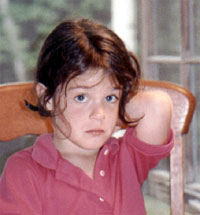 "Don't
cry, Annie-banannie," I soothe my little
girl; "if you don't want a broken cookie,
take a whole one." Tears rim her eyes, bright
blue, with black starpoint lashes. I nestle her
close and wipe them away. "Don't
cry, Annie-banannie," I soothe my little
girl; "if you don't want a broken cookie,
take a whole one." Tears rim her eyes, bright
blue, with black starpoint lashes. I nestle her
close and wipe them away.
No
time for pain.
"It's
OK she touched it, Sasha," I josh her big
brother -- big, as in five. "We're family;
we eat each others' germs all the time."
I caress his warm cheek with my hand; cherish
the green-brown kaleidoscopes still opening in
his eyes, his lashes long as awnings, his size-four
feet that barely touch down.
*
Something
terrible is happening to me.
The
ob-gyn said the numbness would disappear once
Anna was born. But in two years it's spread across
the bottom of my foot and up the other ankle.
Why
is it spreading? What's wrong?
Forget
it. Don't think about it.
*
Something
is making my fingers tingle, and buzz, and go
numb.
"Sasha,
sweetheart, please stop squiggling so I can button
your shirt. We'll get to the swings much sooner
if you stay still."
Why
can't I feel buttons anymore? Find buttonholes?
Fish dimes from my wallet?
Maybe
I'm always in a hurry . . . .
*
Something's
jabbing my left foot -- like tiny medieval demons
wielding hot pins and needles, and plunging them
deep.
Could
there be nails in my shoe?
A
year ago, they were torturing my ankle.
"Ouch!"
Six
months ago, they started gouging my calf.
"What's wrong, Mommy?"
Now
they're attacking my thigh.
"Sasha,
is there a pin stuck in the back of my jeans?"
"Nuh-uh,
Mommy; nothing there."
What
the hell is going on?
*
"Bedtime
-- book time," I call.
One
bright-white polka-dot of light pulses in my left
eye . . .
"I
pick first," Sasha yells.
"No,
it's my turn," Anna yells back.
It
flashes like a shorted-out bulb . . .
"Let's
snuggle up and read both, you guys."
Like
a pin-dot blind spot.
"Once
upon a time . . . . "
Shut
up! No time for melodrama -- just read.
"When
wishing still counted . . . . "
*
Something
makes my skin so sensitive that the swish of my
summer skirt, the warm silken water of the lake
at Stockbridge, even the stroke of Jim's hand,
sears across my leg like acid. 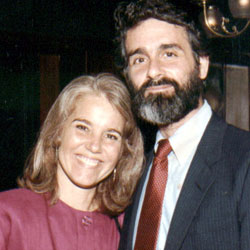
"Um,
Sweetheart? The other leg now?"
Dear
Jim -- my smart, sexy, high-watt husband. He's
so overwhelmed by his labor law practice; how
can I add one more worry? Nope; not one whisper
about these wacky symptoms.
*
What's
filling my leg with strange static? Why does it
scatter sharp sequins of pain with every step?
Am
I just imagining this? Am I a hypochondriac, wanting
attention like my mother? Not if I don't tell
anyone. Well, imagining something beats having
a real disease. Though that makes me crazy, right?
Wrong. And nobody could invent this pain. I'm
blessed with a florid fantasy life -- but, hey,
I write kids' TV, not horror flicks.
*
Now
the edges of my left leg shimmer and blur -- as
if Scotty started beaming me up to Starship Enterprise,
then forgot to finish the job.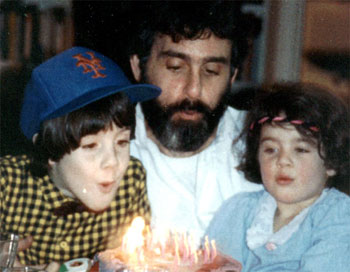
Sasha
twirls in a giddy circle: "Six, six, I'm
almost six! Say about my birthday party again,
Mama."
"Well,
we'll go to the Central Park Carousel with all
your friends . . . "
How
will I ever walk all that way?
"And
we'll play Pin The Tail on the Wolf . . ."
And
back?
"
. . . and I'll bake you a big green birthday cake
-- "
"Green's
my favorite!"
Don't
think; just do it.
*
Something
in my body is moving between the brutal and the
bizarre.
"Push
my swing, Mama," calls Anna.
"Mine,
too," calls Sasha.
Something
makes me gray with fatigue, till the joy of pushing
my kids on the swings becomes a sheer act of will.
"Push
me higher, Mommy, higher! I want to fly,"
Sasha sings out.
Hot
spots light up and burn along my arms, neck, and
ears -- as if some sadist were rubbing them hard
with Szechwan peppers.
"Look
at me, Mama -- my toes touch the sky," Anna
sings back.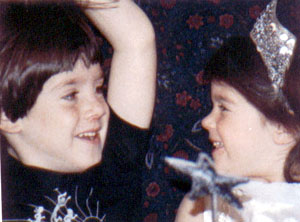
Stop
it! Don't dwell on it.
"Look
at me!"
Think
about something else.
"Look
at me!"
Think
about how beautiful your children are.
I
don't have time to be sick.Think
about Jim's sweet dark eyes.
I
don't want to be sick.
Something
terrible is happening. And it's getting worse.
I
won't let myself be sick.
I
can't make it stop.
I
won't let anything hurt us.
Something.
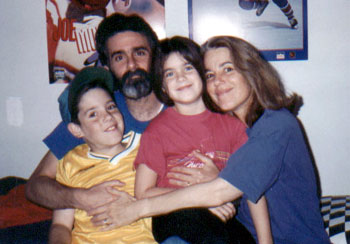 *
* * *
* *
After
two years of silently enduring these mysterious,
increasingly severe symptoms, I both want -- and
fear -- a diagnosis. I'm afraid of what this physical
cacophony means, yet need a name for the strange
and frightening sensations reverberating through
my body. When I finally tell my internist, he
packs me right off to a neurologist he describes
as brilliant, no-nonsense, and thorough.
Right
on all counts; except he forgets to mention that
Linda Lewis is also an attractive Amazon of a
woman -- over six feet, with prematurely white
hair cut short and blunt; big gray eyes behind
glasses that make them even bigger; thick black
lashes and brows in a strong face with wide cheekbones
and a generous mouth. Her large hands look capable
of doing anything well, from setting broken bones
to rappelling down a mountain. She listens carefully
to my strange conglomeration of maladies, asks
a few incisive questions, but mostly just listens
as I describe what I feel.
When
I finish, she makes a quick sketch in red ink
on one of those human-body coloring-book-type
outlines neurologists keep close at hand for recording
afflictions. Her sketch uncannily mirrors my own
mental picture of my pain -- which feels so tangible,
so "visible," that I envision it as
a network of chartreuse neon lines criss-crossing
my body. Now, there it is on paper: my own chartreuse
images -- transmogrified, but heard, understood,
recorded.
"You
probably thought you were crazy, but you're not,"
Dr. Lewis says. "These sensations may seem
peculiar and unrelated to you, but they draw a
very clear picture for me: they follow the nerve
roots all over your body."
So
it's real. I have objective confirmation. I take
a deep breath for the first time in months. She
understands me -- and my pain. I will be eternally
grateful just for that.
But
a split-second later, it slams into me: corroboration
is very cold comfort. Something is really wrong.
While
I struggle with this paradox, Dr. Lewis writes
a flurry of blood test and laboratory slips, then
hands them to me.
"These
tests are used to diagnose nerve disease. Maybe
they'll make the picture clearer," she says.
"Come back when I have the results, and we'll
see."
*
* *
I quickly learn to loathe the EMG, or electromyograph,
more than any other neurological test. First I
ride the elevator to a suspiciously quiet floor
at the Neurological Institute. I go alone on the
premise that this is my body, and I should begin
now not to inflict my clinical trials and tribulations
on anyone else. I shed my clothes and identity,
and don an especially limp and frumpy hospital
"gown." Then I wait an unconscionable
length of time in a frigid little cubicle until
a white-coated Ph.D. appears with no greeting
or apology for the long delay. With no explanation
whatever, he orders me to lie down on a narrow
examining table, grunts "Don't move,"
and -- with absolutely no preamble -- jabs long
pins attached to electrodes and wires deep into
the most painful parts of my most painful muscles
until they make contact with my most painful nerves.
In my efforts not to scream or kick, I force myself
to think about something -- anything -- else.
Dr. Josef Mengele comes immediately to mind.
"We
will now begin the procedure," he announces
to a spot somewhere near the overhead light fixture.
Begin?
I thought it was almost over.
"Don't
move," he repeats. I wouldn't dare.
With
this, Dr. Sadist turns on the electric current
that feeds the needles stuck in my legs, then
blandly and cold-bloodedly records my pain as
a wavy graph on what looks like a TV screen. It
now feels as if my legs are hard-wired into several
dozen electrical sockets. Or maybe the way it
feels when I crack my elbow on the edge of my
desk. I think it may feel like the neurological
equivalent of the electric chair. Unfortunately,
I do not die, though it crosses my mind as a rather
attractive alternative.
I
actively question myself as to whether I am merely
being a wuss about all this until I learn that
a certain well-known professional football player
tore the electrified pins from his legs and ran
cussing from the Procedure Room because he couldn't
bear the pain. In many ways, however, this is
irrelevant. He could still run; I'm too undone
by pain and indignation to think of lifting my
foot.
Finally,
just before I start to smoke, Dr. Mengele turns
off the machine. While I'm still limp and quivering,
he yanks out the needles and announces, "Time
for Evoked Potentials."
Uh-Oh.
He
calls a lowly technician into the room. She fries
the surfaces of my arms and legs with special
infra-red lamps. When I am broiled to the proper
sizzle, he attaches new, circular electrodes to
highly sensitive spots on the surfaces of one
arm and one leg in order that he might administer
a series of increasingly intense electric shocks
to my nerves and record exactly how long it takes
me to twitch. I try to remind myself that both
these modern medical variations on the medieval
rack are designed to yield objective measurements
of how quickly my nerves receive and relay information
to and from my muscles and spinal cord. But even
before the results are in, I know these tests
prove one thing unequivocally: I am a total coward
when it comes to pain -- any pain, but particularly
gratuitous pain. Of course, I could have told
them that before enduring any tests at all.
*
* *
Dr.
Lewis remains undaunted when she calls to tell
me the test results are equivocal -- they reveal
no clear pattern of nerve damage. She now announces,
in what I'm learning is her characteristically
cavalier fashion, that it is time for a nerve-and-muscle
biopsy. This turns out to be an utterly excruciating
little surgical procedure in a real-live operating
room. Using only local anesthesia, a lively, handsome
young neurologist named Dr. David Younger will
remove about a tablespoon of muscle and just a
smidgen of sural nerve from the back of my left
calf for examination under a microscope. Unfortunately,
I must be fully conscious during the entire operation
so he will "know" when he cuts the nerve.
Barely
two weeks later, I'm in an operating room, lying
prone on a narrow padded table that looks more
like my Nana's ironing board than I would have
imagined from Hollywood versions. In fact, nothing's
quite what I expected: the small, white-tiled
room looks a little like a kitchen; the nurse
has a beard and tells me how much his little girl
likes Reading Rainbow, the children's TV series
I write; and Dr. Younger not only has a soul but
a sense of humor.
It
takes far more digging to find that skinny skein
of nerve than either of us like, but we chat quietly
about religion, Brahms, this-and-that while he
pokes around in my left calf. The surgical nurse
holds my hand whenever he's not busy, and we all
make awful puns about having a lotta nerve, being
nervous, etc.
But
when Dr. Younger finally hits that nerve, there
is absolutely no doubt: he knows. So does everyone
else anywhere near that crowded, stuffy little
room. When he severs the nerve, pure pain explodes
in my leg, drills up my spine, and makes me puke.
Yet
even in hell there are funny moments. As soon
as I finish retching into a stainless steel kidney
basin, I croak, "How come when you cut a
nerve in my leg, I throw up?" Dr. Younger
doesn't miss a beat: "Don't you know the
leg bone's connected to the stomach bone?"
Then,
taking my question seriously, he stops cutting
and explains, "Local anesthesia blocks some
transmission of pain to your brain. But your body
always knows when it suffers an insult like this
-- and it rebels."
His
compassionate explanation makes me feel human
again -- not like some wide-awake corpse getting
dissected. He looks at me very kindly, and asks,
"Are you really OK? I hate to hurt you. We
could take a little break if you need it."
"No,
I'm OK," I say.
Then,
as if rehearsed, he and I and the nurse, who's
still holding my hand, launch into a rather off-key
rendition of "Dem bones, dem bones, dem dry
bones" as he finishes removing muscle and
starts sewing the first of 29 stitches. I know
I will love this guy forever.
*
*
*
It
takes almost two weeks to get the biopsy results.
My first hint that something must be wrong occurs
late on a Friday afternoon, when the internist
tips me off with a phone call. This in itself
is surprising on a brilliant October day at the
start of a peak leaf-watching weekend. What's
a doctor doing in his office at 5 PM on a Friday?
"You
speak to Linda yet?" he asks much too casually.
"About the biopsy? No, not yet," I answer.
Uh-oh, I think; something's wrong. I start churning
out disaster scenarios: Cancer. Degenerative disease.
Amputation. Death. Stop
it!
"Well,
she's been trying to reach you, so you'd better
give her a buzz," he says.
"What
does it show?" I ask. He suddenly becomes
very busy.
"Gotta
go," he says; "talk to Linda."
And he hangs up.
The
phone rings again. It's Gloria, "Linda's"
secretary.
"Miss
Schecter? Dr. Lewis would like to see you at her
office next Monday at one. Dr. Younger will be
there, too. Can you make that?"
"Uh,
yes," I stutter, "b-but could we come
right now? Or -- could I just talk to her about
the biopsy results?"
"No-no,
she's too busy; she can't come to the phone. But
she definitely wants to see you Monday."
"We'll
be there. But -- couldn't I just speak to her
for a minute?"
"No,
she's leaving right now for a weekend in the country."
And
that was that.
*
* *
Our weekend looks normal: wall-to-wall kids, terminal
exhaustion and, for me, what's now "normal"
pain plus breath-snatching post-op anguish. Jim
and I always take turns getting up early with
the kids on weekends -- instead of snuggling together
in bed and getting interrupted every two minutes,
one of us sacrifices so the other can catch up
on lost sleep. Saturday it's my turn, so I'm up
before dawn with the kids, who bounce around smelling
fragrant as fresh-baked bread still warm from
the oven. We cuddle inside a quilt on our window
seat overlooking 72 and West End, watching the
West Side wake up: first the garbage truck parade,
then a rising tide of buses and cars, then yawning
dogs walking their yawning owners.
Our
high point is always the dog across the street.
Each day at 6 am, the doorman at 253 West 72 ceremoniously
opens the door for a scruffy blond dog who pads
slowly to the corner Korean deli, fetches the
Times, then returns home holding the paper proudly
in his mouth.
Jim
and I always try to walk the parental high road:
no-sweet-cereal, no-violent-cartoons, only-one-hour-of
TV-a-day. But when exhaustion clamps down hard
-- like today -- I crash on the couch and settle
for second best: replay #4,358 of The Land Before
Time, Sesame Street, or another "worthwhile"
video. Instead of sugared cereal, I serve pretzels,
milk, and Granny Smith apple slices. After my
nap and a real breakfast, we all get dressed.
Then, hobbling on a cane and flattering Sasha
into pushing Annie's stroller, I take the kids
to the Museum of Natural History while Jim goes
to the office to prep for a trial. I sink to the
floor in the Dinosaur Hall and nearly weep when
a guard hustles me back onto my numb and painful
legs. Sunday, we three head for the playground
in Riverside Park with a picnic while Jim goes
back to work -- Jim's trials are always my tribulations.
Beneath
the mundane -- between pb&j sandwiches, endless
cups of apple juice, macaroni and cheese, spaghetti
and turkey balls, and bubble baths with my hands
shooting so many electric sparks I almost expect
to electrocute one of us -- I have a sense of
the beach sliding out beneath me in an ebbing
tide.I feel like I'm walking on top of a thin
m&m sugarshell reality that I will crash through
on Monday at one o'clock.
What's waiting there, underneath?
*
*
*
Monday brings full-blast sunshine, an intense
autumn-blue sky, and trees fairly shouting with
color. But it's never a sunny day inside the Neurological
Institute, no matter how vibrant the weather is
right outside the sliding glass doors. The light
is always a waxy, hideous yellow fluorescent that
makes the healthy resemble the dead, and the unhealthy
gray as mummies and even more horrifying. The
floor, waxed too many times, is too slippery for
canes and crutches, and there are never enough
seats for the infirm to perch on while we wait
in utter silence for the maddeningly slow elevators.
I try not to see the people with Frankenstein
stitches showing through the new stubble on their
scalps; others with completely empty eyes slumped
in wheelchairs; and the walking wounded who limp,
shake, drool, and drag their feet. A few poor
souls get walked along like flaccid, obedient
dolls, or dogs on invisible leashes, by hollow-eyed
relatives or unconcerned aides. Some simply stare
at the ugly linoleum and cry. Two, three, five
minutes in that lobby and I feel waxed to the
floor -- helpless, hopeless, inert.
All
this, just waiting for the elevator.
"Elevator
going up," chants a mindless recorded voice.
"Elevator going up, watch the closing doors."
Thank you. Just in case I never thought of it
before, the voice reminds me that nerves feed
my eyes as well as my muscles.
The
action picks up as soon as we reach the second-floor
waiting room. This is it, the moment I've been
seeking and dreading: my post-op, diagnostic consultation.
Drum
roll, please.
But
now something weird begins to happen. I quickly
discover the great advantages of denial -- a psychological
state which allows persistent negation of the
undeniable facts right in front of your nose --
an evasion I'd always assumed was "bad"
and "weak" and thus reserved for weenies.
But I am about to discover that denial is actually
good. Very good.
Jim
and I sit in the over-crowded waiting room, alternating
between stiff silence and irrelevant giggling
over nothing. His hand holding mine is icy. Slippery.
I try to concentrate on the new and attractive
decor.
An
agitated woman rushes into the room.
"Are
you Ellen Schecter?" she practically yells.
I nod, and she hands me an envelope with my name
typed on it. Misspelled.
"Dr.
Lewis said be sure to read this before she meets
with you."
She exits quickly, as if relieved to get away
from us. I never saw her before, and never see
her again.
Jim
and I move even closer together and read the letter,
clutching cold, sweaty (in my case numb) hands.
|
Dear Ms. Schecter,
|
|
As
you know, the biopsy is abnormal . . . .
It indicates demyelination with axonal changes
. . . . The teased muscle fibers are abnormal
. . . . demyelination in sensory, motor,
and autonomic nerves . . .
|
"What
does this mean?" Jim asks.
"Not
sure. But demyelination -- not good. That's the
protective coating on the nerves -- "
"Right."
We
read it again. And shrug, mystified. We don't
like that dreaded word "demyelination."
It could mean ALS (Amyotrophic Lateral Sclerosis,
AKA Lou Gehrig's disease) or Multiple Sclerosis,
or who knows what horrible "osis" we
know nothing about.
"Where
the hell is Dr. Lewis?" Jim asks.
We're
so nervous we get punchy. But before we have a
chance to do more than whisper and giggle nervously
like naughty high school kids about this hot tip
we can't decipher, Dr. Lewis appears -- she looks
especially stately today -- and asks us to come
into her office. She doesn't look happy. Or sad.
She tries to watch me walk without appearing to
watch me.
Neurologists
have a bad habit of doing this. They walk behind
you to check out your gait: do you limp? drag?
stumble? wobble? It must be a little trick they
learn in medical school: Remember to use every
available opportunity to observe the patient without
being observed. Rather sneaky, though I actually
prefer it to the alternative: The neurologist
commands "Walk!" and I must perform
a humiliating (in my case lopsided) promenade
up and down an examining room or corridor under
intense scrutiny while wearing a deliberately
frumpy shmatah -- gaping open in the back -- that
the medical community insists on euphemistically
dubbing a "gown."
I
try to walk behind Dr. Lewis so she can't watch
me limp. Because, in fact, it's hard to walk and
I must move slowly while using the cane. I still
can't put my heel down on the floor, and the merest
brush of my skirt against the two biopsy incisions
on my left calf is excruciating. Pulling on panty
hose is an exercise in determination versus agony
that leaves me in a cold sweat. I know she knows
my incisions hurt, but I also know she cannot
imagine how much. I'm afraid to tell her. It will
make it much too real.
She
keeps trying to sidle behind me, and I keep trying
to slip behind her. It's an awkward little minuet,
and once again I give a half-giggle.
"Nice
skirt," she observes. "New?"
I
nod yes.
"Trying
to hide the scars on your leg?"
This
is her version of small talk.
Kind
Dr. Younger still hasn't arrived by the time we
file into Dr. Lewis's office. I sink gratefully
into the maroon leather chair in front of her
massive mahogany desk, which is roughly the size
and heft of a coffin. I notice that the room has
been redecorated since she sent me for surgery.
Someone worked quite hard to re-create exactly
the same perfectly dull and innocuous 1930's "Consulting
Room" style it had before: same ugly no-color
cretonne drapes, same old tomes with depressing
titles -- Brain Tumors, Multiple Sclerosis, Diseases
of the Nervous System -- same leather chairs with
brass studs, same enormous desk piled with files,
same little examining room off to one side with
white enamel cabinets, basins, and sharp-pointed
instruments displayed behind glass doors. This
all-white chamber of horrors is already haunting
my sweatiest nightmares.
I
sit there inhaling the musty air, and imagine
John Gunther sitting in this chair in this room
with the same Thirties' smell, maybe even the
same dust motes dancing in the sunlight, making
mental notes for his book, Death Be Not Proud.
I imagine his heart breaking as he tried to escape
into the ugly pattern of meaningless arabesques
on this same rug while a doctor informed him that
his beloved young son will die from a brain tumor.
The
place still reeks of stale sunshine and despair.
I wonder how many other people before me sat in
this same massive leather chair -- much grander,
probably, than the ones they have at home -- waiting
for the watershed news that slices lives forever
into Before and After.
I
imagine them, like me, trying to calm down and
stop shaking, trying to conjure up all the rational
questions I can't remember or haven't thought
of yet. Like all those other poor suckers, I take
deep, reassuring breaths as I convince myself
that the news cannot be all that bad. Denial.
I glance at Jim: his sweet dark eyes look even
bigger than usual; frightened and a little too
shiny. He still grips my hand, white-knuckled,
as if he's afraid I'll float away from him.
Dr.
Lewis wears a blouse that at first glance resembles
silk but is really polyester. 'Less up-keep,'
my desultory brain muses. This blouse is crimson,
which looks especially handsome with her prematurely
white hair and big gray eyes that look pretty
even without make-up.
I'd
love to see her wearing mascara just once, I think,
drifting further into the Denial Zone. The make-up
tangent, designed to keep me thinking about anything
except what's happening to me right now, reminds
me of a story I heard from another patient. She
told me how Dr. Lewis suddenly appeared in the
hospital one New Year's Eve just before midnight
to check on a dangerously ill patient; how everybody
stopped breathing for a moment when all six feet
of her swept into the ward in a floor-length swathe
of black velvet. I fall in love all over again
with that image of her: the avenging Doctor-Angel
guarding her patient from Father Time's scythe,
robed in black velvet, glittering with the sharp
scintillation of knowledge and know-how and diamonds
. . . except, wouldn't she wear rhinestones? She's
far too practical to spend all that money on diamonds
. . . .
The
image dissolves and I concentrate on the sun motes
dancing haphazardly in front of the window. It
probably hasn't been washed more than two or three
times in the decades since John Gunther's son
died.
Throughout
my reverie, Dr. Lewis rustles papers into piles,
sorts pens and pencils, puts large paper clips
around the letters and lab reports bulging out
of my rapidly expanding chart. I watch the clips
immediately slide off again. She avoids looking
at me. She chatters about something very neutral
and irrelevant, so I go back to the sun mote ballet,
humming the Sixth Brandenburg Concerto in my head,
and waiting for the movie to begin.
Now
she clears her throat, pushes her glasses back
up her nose, shoots one quick look at my face,
then tries fitting a large, evil-looking pincer
clip around the unruly papers. It bites and holds.
She clears her throat again, looks up, and says,
"Well,
you've got a disease."

email
us with your comments.
|